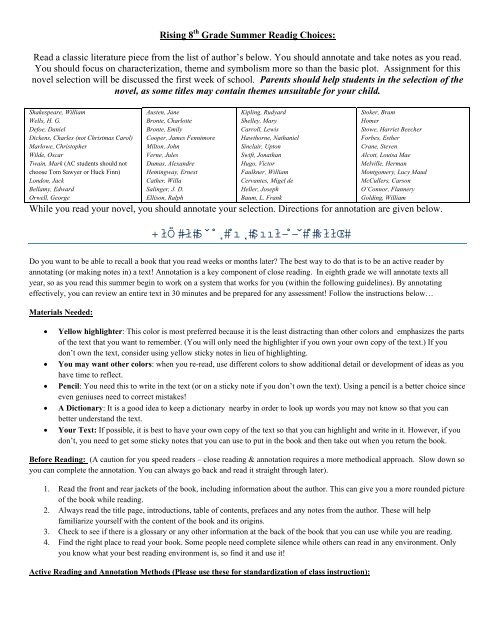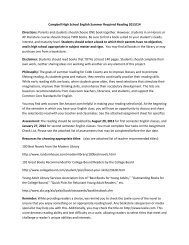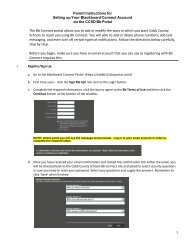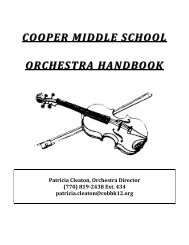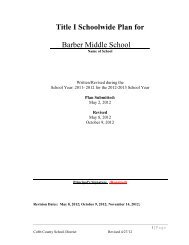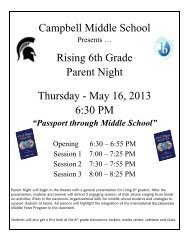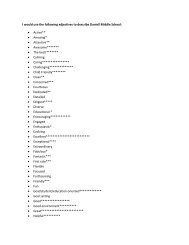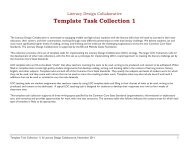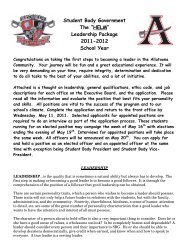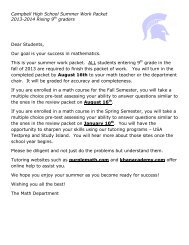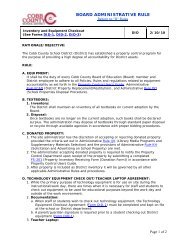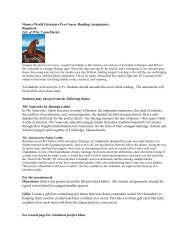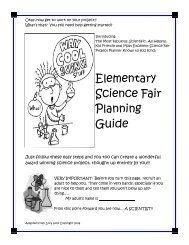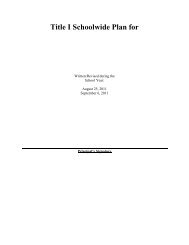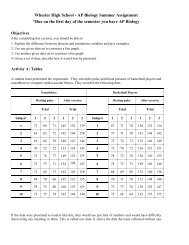Summer Reading Program - Cobb County School District
Summer Reading Program - Cobb County School District
Summer Reading Program - Cobb County School District
You also want an ePaper? Increase the reach of your titles
YUMPU automatically turns print PDFs into web optimized ePapers that Google loves.
Rising 8 th Grade <strong>Summer</strong> Readig Choices:<br />
Read a classic literature piece from the list of author’s below. You should annotate and take notes as you read.<br />
You should focus on characterization, theme and symbolism more so than the basic plot. Assignment for this<br />
novel selection will be discussed the first week of school. Parents should help students in the selection of the<br />
novel, as some titles may contain themes unsuitable for your child.<br />
Shakespeare, William<br />
Wells, H. G.<br />
Defoe, Daniel<br />
Dickens, Charles (not Christmas Carol)<br />
Marlowe, Christopher<br />
Wilde, Oscar<br />
Twain, Mark (AC students should not<br />
choose Tom Sawyer or Huck Finn)<br />
London, Jack<br />
Bellamy, Edward<br />
Orwell, George<br />
Austen, Jane<br />
Bronte, Charlotte<br />
Bronte, Emily<br />
Cooper, James Fennimore<br />
Milton, John<br />
Verne, Jules<br />
Dumas, Alexandre<br />
Hemingway, Ernest<br />
Cather, Willa<br />
Salinger, J. D.<br />
Ellison, Ralph<br />
Kipling, Rudyard<br />
Shelley, Mary<br />
Carroll, Lewis<br />
Hawthorne, Nathaniel<br />
Sinclair, Upton<br />
Swift, Jonathan<br />
Hugo, Victor<br />
Faulkner, William<br />
Cervantes, Migel de<br />
Heller, Joseph<br />
Baum, L. Frank<br />
While you read your novel, you should annotate your selection. Directions for annotation are given below.<br />
<br />
Stoker, Bram<br />
Homer<br />
Stowe, Harriet Beecher<br />
Forbes, Esther<br />
Crane, Steven<br />
Alcott, Louisa Mae<br />
Melville, Herman<br />
Montgomery, Lucy Maud<br />
McCullers, Carson<br />
O’Connor, Flannery<br />
Golding, William<br />
Do you want to be able to recall a book that you read weeks or months later? The best way to do that is to be an active reader by<br />
annotating (or making notes in) a text! Annotation is a key component of close reading. In eighth grade we will annotate texts all<br />
year, so as you read this summer begin to work on a system that works for you (within the following guidelines). By annotating<br />
effectively, you can review an entire text in 30 minutes and be prepared for any assessment! Follow the instructions below…<br />
Materials Needed:<br />
<br />
<br />
<br />
<br />
<br />
Yellow highlighter: This color is most preferred because it is the least distracting than other colors and emphasizes the parts<br />
of the text that you want to remember. (You will only need the highlighter if you own your own copy of the text.) If you<br />
don’t own the text, consider using yellow sticky notes in lieu of highlighting.<br />
You may want other colors: when you re-read, use different colors to show additional detail or development of ideas as you<br />
have time to reflect.<br />
Pencil: You need this to write in the text (or on a sticky note if you don’t own the text). Using a pencil is a better choice since<br />
even geniuses need to correct mistakes!<br />
A Dictionary: It is a good idea to keep a dictionary nearby in order to look up words you may not know so that you can<br />
better understand the text.<br />
Your Text: If possible, it is best to have your own copy of the text so that you can highlight and write in it. However, if you<br />
don’t, you need to get some sticky notes that you can use to put in the book and then take out when you return the book.<br />
Before <strong>Reading</strong>: (A caution for you speed readers – close reading & annotation requires a more methodical approach. Slow down so<br />
you can complete the annotation. You can always go back and read it straight through later).<br />
1. Read the front and rear jackets of the book, including information about the author. This can give you a more rounded picture<br />
of the book while reading.<br />
2. Always read the title page, introductions, table of contents, prefaces and any notes from the author. These will help<br />
familiarize yourself with the content of the book and its origins.<br />
3. Check to see if there is a glossary or any other information at the back of the book that you can use while you are reading.<br />
4. Find the right place to read your book. Some people need complete silence while others can read in any environment. Only<br />
you know what your best reading environment is, so find it and use it!<br />
Active <strong>Reading</strong> and Annotation Methods (Please use these for standardization of class instruction):


